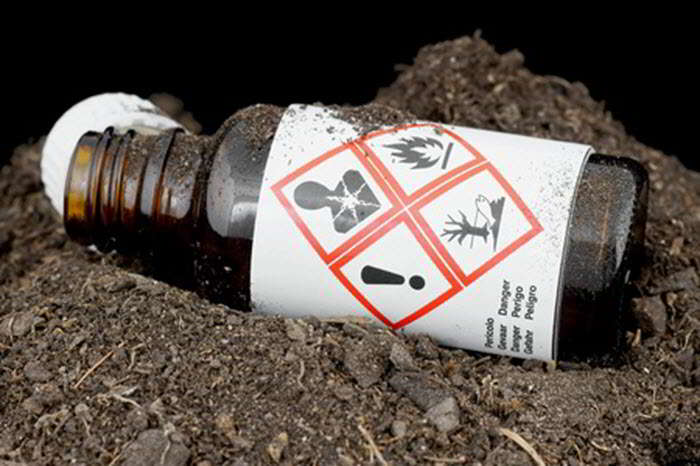How do You Define Hazardous Waste?
Hazardous waste are materials that pose a substantial threat to the environment, wildlife and public health due to their hazardous properties such as being toxic, flammable, radioactive, or corrosive. Due to the environmental threat posed by these materials, hazardous waste disposal is kept strictly separated from the municipal solid waste stream and is heavily regulated by the local, state, and federal authorities.
There are four categories of hazardous waste:
The U.S. Environmental Protection Agency has four classifications for hazardous materials:
Listed Wastes - are wastes specifically classified by the EPA as being hazardous. These include wastes produced from manufacturing and industrial processes and commercial chemical products.
Characteristic Wastes - are those not explicitly listed by the EPA as hazardous but exhibit hazardous characteristics such as ignitability (oils or solvents), corrosivity (acids), reactivity, or toxicity (fatal if ingested or absorbed by the body).
Universal Wastes - are common types of hazardous waste that the EPA has streamlined waste collection standards to encourage retailers and municipalities to establish their own collection programs. Common examples include fluorescent tubes, batteries and thermostats.
Mixed Wastes - are those that contain both radioactive and hazardous waste components such as waste generated by nuclear power plants, and medical research.
Keep Your Dumpster Clear of These Hazardous Items:
The following items are considered universally hazardous and should never be placed in your dumpster. They will not be accepted by landfills, so alternate disposal methods must be employed. This list may vary based on several local factors so please consult us first:
Tires - Do not place tires in a dumpster. Tires are usually not acceptable by landfills since methane gas can build inside the tire's inner wall, making the tire "float" to the top of the landfill which breaks the landfill's ventilation pipes and plastic liners. Instead, contact your local recycling facility for proper tire disposal procedures.
Automotive Fluids – Motor oil, Hydraulic oil, oil filters, engine coolant, antifreeze, transmission fluid, and the like present many hazards to the environment. Proper disposal is a must. Most nationwide retailers, auto parts and mechanic shops offer recycling of automobile oils and other hazardous fluids.
Car & Lithium Batteries - Car batteries are extremely hazardous since they contain high levels of lead and many other heavy metals. Recycle dead car batteries by taking them to an auto parts store or authorized recycling center for recycling. Lithium batteries, like those found in laptops, can be recycled at electronics shops. General-purpose alkaline batteries are acceptable to dispose of in a dumpster.
Paints & Lacquers - Leftover paints, lacquers, stains and varnishes are prohibited due to the harmful elements they contain such as lead or mercury. Contact your local household hazardous waste (HHW) collection site for disposal guidelines. Only empty paint cans that have been thoroughly dried can be tossed in a dumpster.
Asbestos - Asbestos is considered to be a carcinogen in most US states and is therefore banned from most landfills. It is a heat resistant material that was used for insulation in older homes and various industrial products.. Only licensed contractors should handle asbestos removal from homes or offices due to the dangerous health consequences.
Medical Waste - Medical waste are materials used in medical treatments that have come into contact with bodily fluids such as hypodermic needles and used bandages. They should be disposed of only by licensed medical waste haulers.
Ink & Resins - Printer Ink, as well as resins, can damage equipment and stain the interior of dumpsters. Many recycling centers or large office supply retailers offer in recycling.
Industrial Drums - Industrial drums contain hazardous by-products of different industrial processes and should only be disposed of through licensed industrial haulers. If the drums are clean, they can be recycled for use as scrap metal.
Fuel - Fuels such as Gasoline/petroleum are highly flammable and prohibited by most landfills. Contact your local recycling authorities or fire department to locate a hazardous waste disposal station near you for proper fuel disposal.
Refrigerants - Items containing refrigerants such as refrigerators and air conditioning units must be completely drained prior to disposal. Refrigerants are hazardous to the environment. Please contact us for refrigerator disposal procedures in your area.
Propane Tanks - Propane tanks are not allowed in dumpsters or landfills since they could leak dangerous gases or cause explosions. Contact your local propane company or fire department for guidance and proper disposal information.
Household Cleaners - Chemical liquids such as household cleaners are not accepted by landfills since they contain harmful chemicals and pollute the environment.
Fluorescent Tubes
Ammunition
Aerosol Cans
Pesticides, Herbicides And Fertilizers
Animals
